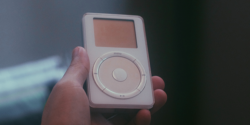Thanks to James Cridland at Podnews, I was reminded that today, July 9, 2023, marks the 20th birthday of the first-ever podcast recording. As James notes, this was the day that Dave Winer – author of the enclosure tag added to RSS to make it possible to automatically download an audio file – recorded the first episode of what would become Radio Open Source, hosted by Christopher Lydon. The show is still heard on the radio and via podcast today.
Though on-demand radio show audio had been posted to the internet for at least a decade prior, podcasting as we know it was born when RSS made it possible to build applications – once called “podcatchers” – to automatically check for new episodes of a show and download them, as we do today using platforms like Apple Podcasts and Spotify. That was the birth of the “podcast feed” that you could subscribe to, so that you didn’t have to check a website to see if a new show was posted.
I remember doing just that before 2003, to catch both broadcast and internet radio shows. I was on the other side, too, posting my community radio program, “mediageek” for non-local and time-shifted listening.
I’d already been using RSS to keep tabs on my favorite blogs, pre-Google Reader (R.I.P.), and was excited for the system to gain the capacity to distribute audio. At the time, a lot of online audio was still distributed by proprietary and often expensive streaming systems like RealAudio, frequently beyond the reach of community and grassroots producers. I immediately understood the potential for RSS to make it easier for producers and listeners, alike. Note that we didn’t yet call this a “podcast.” Writer Ben Hammersley wouldn’t coin the term for another year.
I hand coded my first podcast feed – adding the enclosure tag to an existing RSS feed – somewhere in late 2003. Any evidence of that site and files is lost to several server and platform migrations. By 2004 blogging platforms started making it easier to add enclosure tags, so my radio show could now be subscribed to as a podcast. Those episodes are still online (though migrated to WordPress towards the end of the decade).
I didn’t become a regular podcast listener until some time in 2004. At the time you either listened to shows on your PC, or downloaded them to portable media player, such as the medium’s namesake iPod. Smartphones as we know them didn’t exist, and few people had mobile internet. iPods and MP3 players were not internet devices.
Having never owned an iPod, I actually used my minidisc recorder (incidentally, Lydon also used a minidisc recorder in his portable “blog audio studio“). The NetMD feature let you connect it via USB to a PC and download audio to it. It was about as fast as downloading to an iPod, and a disc could hold up to four hours using the new long-play modes. This still meant you also had to plan ahead for your listening. I would often load up a disc the night before so I would have something to listen to on my next day’s commute. Discs were re-writeable, so I would just reuse the same ones over and over.
The real magic of podcasting being built on RSS is that it isn’t owned and controlled by any one entity. It’s an open protocol. Anyone can build a podcast feed and submit it to a directory like Apple Podcasts or Spotify. But even if it’s not in a directory, a listener can get the feed URL and pop it into many a podcast player app.
It means that a podcaster is not dependent on a single platform, like YouTube, TikTok, Twitch or Instagram. You just need an account with a web host, or a podcast-specific host. If you need to change that host, most provide pretty simple tools to export and migrate your content. Though, it’s highly recommended to also keep your own backups. Because podcasting isn’t just on one site, it can require a little more technical expertise than just hitting record on an app – even so, some hosts make that simple. But the payoff is that the whims of any one corporation are less likely to shut you down.
That said, I have to acknowlege that the definition of “podcast” is getting broader these days. There are plenty of shows on YouTube or Twitch that creators and consumers consider to be podcasts, that may not be distributed by RSS or available on any audio podcast platform. With the death of the iPod and a growing dependence on large social media platforms, the techical roots of podcasting have become obscured. So the term seems to have become more about the form than the technology.
Though I’m still a strong advocate for the open ecosystem that RSS creates for podcasting, I’m not pedantic about it either. Instead, I’m amazed by how podcasting revitalized talk audio programming and nutured a widely diverse universe of programs across the internet. If someone sees their YouTube channel as a podcast I don’t want to argue with them. To me that’s too much like gatekeeping. Instead, I would like to introduce them to the wider world of the medium, so they might have the knowledge to become less dependent on any one platform, and possibly embrace distributing their show via RSS, in addition to YouTube.
Podcasting’s decentralized nature may have slowed its growth, really not becoming particularly mainstream until its 10th birthday. But rapid growth isn’t necessarily the best possible outcome. Being decentralized means a single billionaire can’t entirely take it over and bend it to his will. That’s a feature, not a bug, and has been key to podcasting’s survival. I think it will continue, too.



